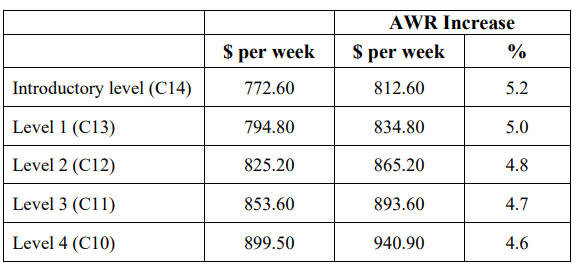Average Weekly Ordinary Time Earnings (“AWOTE”) is a statistic used to index certain superannuation thresholds and a range of Commonwealth legislation including Child Support, Higher Education Funding and certain Excise Tariffs.
The figure used for AWOTE is the original release value for the middle month (i.e. May or November) of the relevant quarter, not later adjusted by trend.
- The month of May is used as the benchmark for the June quarter
- The month of November is used as the benchmark for the December quarter.
Current and recent AWOTE
- 15 Aug 2024 (May 2024 reference period);
- 20 Feb 2025 (November 2024 reference period)
| Year | June Quarter | December Quarter |
| 2023 | $1,838.60 trend $1,906.60 original | $1,886.50 trend $1,888.80 original |
| 2022 | $1,769.80 | $1,805.90 trend $1,807.70 original |
| 2021 | $1,737.10 | $1,748.40 |
| 2020 | $1,713.90 trend $1,713.90 original | $1,711.60 trend $1,711.60 original |
| 2019 | $1,633.80 trend $1,634.80 original | $1,658.70 trend $1,658.40 original |
| 2018 | $1,586.20 trend $1,585.30 original | $1,604.90 trend $1,605.50 original |
| 2017 | $1,543.80 trend $1,543.20 original | $1,567.90 trend $1,569.60 original |
| 2016 | $1,516.00 | $1,533.40 trend $1,533.40 original |
| 2015 | $1,483.10 | $1,500.50 |
| 2014 | $1,454.10 | $1,477.00 |
| 2013 | $1,420.90 | $1,437.00 |
Covid 19 Information: JobKeeper Guidance from the Fair Work Commission (Article published by Russell Kennedy Lawyers, 14 July 2020 )
Latest National Minimum Wage
Annual wage review 2022-23: A decision of the Fair Work Commission made on 2 June 2023 increased the rate of the National Minimum Wage by 5.75% with effect from 1 July 2023.
2023 Decision
In accordance with the order, from 1 July 2023 the national minimum wage is $882.80 per week or $23.23 per hour based on a 38-hour week, with a casual loading, if applicable, of 25%.
See commentary of the 2023 decision here.
The national minimum wage applies to employees not covered by an award or registered agreement. It is determined annually and is used as the calculation base for certain benefits including Paid Parental Leave.
2022 Decision
From 1 July 2022 the national minimum wage was increased by $40 to $812.60 per week or $21.38 per hour based on a 38-hour week (an increase of 5.2% over the 2021 decision).
Modern award minimum wages above $869.60 per week will receive a 4.6% adjustment; wage rates below $869.60 per week will be adjusted by $40 per week. For certain modern awards in the aviation, tourism and hospitality sectors determinations will take effect from 1 October 2022.
2022 Wage Decision Impact

2021 Decision
From 1 July 2021 the national minimum wage is $772.60 per week or $20.33 per hour based on a 38-hour week and if applicable a casual loading of 25%. This is an increase of $18.80 per week on the weekly rate, or 49 cents per hour on the hourly rate.
2020 Decision
From 1 July 2020 the national minimum wage is $753.80 per week or $19.84 per hour based on a 38-hour week and if applicable a casual loading of 25%.
2019 Decision
The 2019 National Minimum Wage from 1 July 2019. From 1 July 2019 the national minimum wage is $740.80 per week or $19.49 per hour based on a 38-hour week. The casual loading is 25%.
2018 Decision
The 2018 National Minimum Wage from 1 July 2018. From 1 July 2018 the national minimum wage is $719.20 per week, calculated on the basis of a week of 38 ordinary hours, or $18.93 per hour and with a casual loading of 25%.
The high income threshold (being the amount of money earned by an employee before the relevant award stops applying to them) is $145,400 as of 1 July 2018.
2014-2017 Decisions
The 2017 National Minimum Wage from 1 July 2017 is $694.90 per week with a casual loading of 25%.
The National Minimum Wage from 1 July 2016 is $672.70 per week with a casual loading of 25%.
The National Minimum Wage from 1 July 2015 is $656.90 with a casual loading of 25%.
The National Minimum Wage from 1 July 2014 is $640.90 with a casual loading of 25%.
The National Minimum Wage for 2013-14 is $622.20 per week with a casual loading of 24%
See also:
- Minimum Wages – Fair Work Australia
- National Minimum Wages Orders
- Earnings in Australia: a quick guide
- Monthly Statistical Bulletin
This page was last modified 2024-02-22
